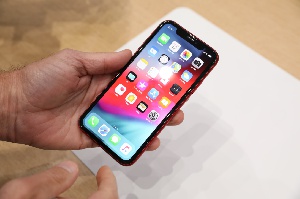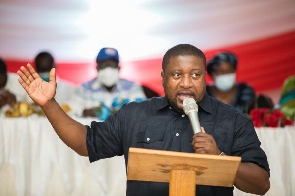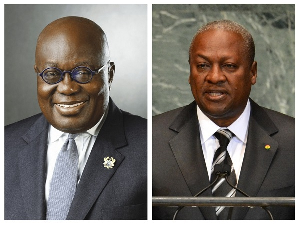STATISTICS FROM the HelpAge Ghana (HAG) indicate that there has been an improvement in the health and life expectancy of the elderly in the society from 4.0% in 1984 to 5.3% in 2000.
The ratio of the elderly to children also increased from 8.5 in 1984 to 12.8 in 2000, which indicates ageing of the population.
Speaking to The Chronicle in Accra, the executive director of HelpAge Ghana, Mr. Eben Adjetey Sorsey, said the fact that the population is ageing, also reflects an increase of the median age from 18.1 years in 1984 to 19.4 years in 2000.
The increase is more pronounced among female, which also indicates that females have benefited from improvement in health and life expectancy more than males.
The results of these changes are that the dependency population reduced from 49.0% in 1984 to 46.6% in 2000.
It also shows that females constitute 50.5% as of the 2000 population compared with 50.7% in 1984, translating into sex ratio of 97.9 males to 100 females in 2000.
Mr. Sorsey said many family members are ashamed to discuss the welfare of their aged relatives if his or her condition is not good to write home about.
He said the organization encourages communities to volunteer to work for the elderly people though some of them want full-time employment.
HelpAge he said has small schemes under which the dilapidated rooms of the poor and destitute elderly in Accra are rehabilitated cater for them.
He accused some families of neglecting aged relations.
Mr. Sorsey said that despite its problems HelpAge is undertaking activities to ensure that the health needs of the elderly people are solved by organizing community clinics and screening with volunteer health teams from government hospitals.
Also those who could not purchase drugs prescribed for them when they attend clinics or hospitals are catered for.
He said the HelpAge Ghana in collaboration with other age care organizations in the country has set up day care centers to serve the needs of the elderly on a centralized basis where food, library and recreation services are provided.
He therefore called on all stakeholders to join hands in caring for the aged by joining the Adopt-A-Granny (AAG) Scheme that links elderly people in need with sponsoring families, organizations and individuals who want to provide regular financial support for their upkeep.
This makes it possible for people to adopt old people suffering from poverty, poor health, and isolation to support them through a monthly subsistence allowance administered by HelpAge Ghana.
He also urged family members to openly come out to discuss issues concerning their old people.
STATISTICS FROM the HelpAge Ghana (HAG) indicate that there has been an improvement in the health and life expectancy of the elderly in the society from 4.0% in 1984 to 5.3% in 2000.
The ratio of the elderly to children also increased from 8.5 in 1984 to 12.8 in 2000, which indicates ageing of the population.
Speaking to The Chronicle in Accra, the executive director of HelpAge Ghana, Mr. Eben Adjetey Sorsey, said the fact that the population is ageing, also reflects an increase of the median age from 18.1 years in 1984 to 19.4 years in 2000.
The increase is more pronounced among female, which also indicates that females have benefited from improvement in health and life expectancy more than males.
The results of these changes are that the dependency population reduced from 49.0% in 1984 to 46.6% in 2000.
It also shows that females constitute 50.5% as of the 2000 population compared with 50.7% in 1984, translating into sex ratio of 97.9 males to 100 females in 2000.
Mr. Sorsey said many family members are ashamed to discuss the welfare of their aged relatives if his or her condition is not good to write home about.
He said the organization encourages communities to volunteer to work for the elderly people though some of them want full-time employment.
HelpAge he said has small schemes under which the dilapidated rooms of the poor and destitute elderly in Accra are rehabilitated cater for them.
He accused some families of neglecting aged relations.
Mr. Sorsey said that despite its problems HelpAge is undertaking activities to ensure that the health needs of the elderly people are solved by organizing community clinics and screening with volunteer health teams from government hospitals.
Also those who could not purchase drugs prescribed for them when they attend clinics or hospitals are catered for.
He said the HelpAge Ghana in collaboration with other age care organizations in the country has set up day care centers to serve the needs of the elderly on a centralized basis where food, library and recreation services are provided.
He therefore called on all stakeholders to join hands in caring for the aged by joining the Adopt-A-Granny (AAG) Scheme that links elderly people in need with sponsoring families, organizations and individuals who want to provide regular financial support for their upkeep.
This makes it possible for people to adopt old people suffering from poverty, poor health, and isolation to support them through a monthly subsistence allowance administered by HelpAge Ghana.
He also urged family members to openly come out to discuss issues concerning their old people.
- The heartbreaking story of a 13-year-old boy with only 2 fingers
- Ministry of Health donates ambulances to four government institutions
- About 30% of children with autism spectrum disorder are minimally verbal - Report
- Parenting with a difference 101: Good food, good childhood and great adulthood
- KATH introduces revolutionary GH¢15,000-per-patient treatment that 'cures' stroke
- Read all related articles










